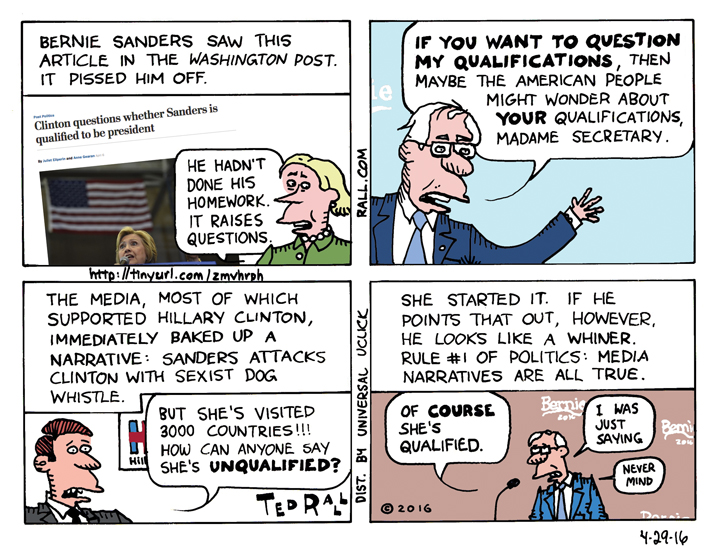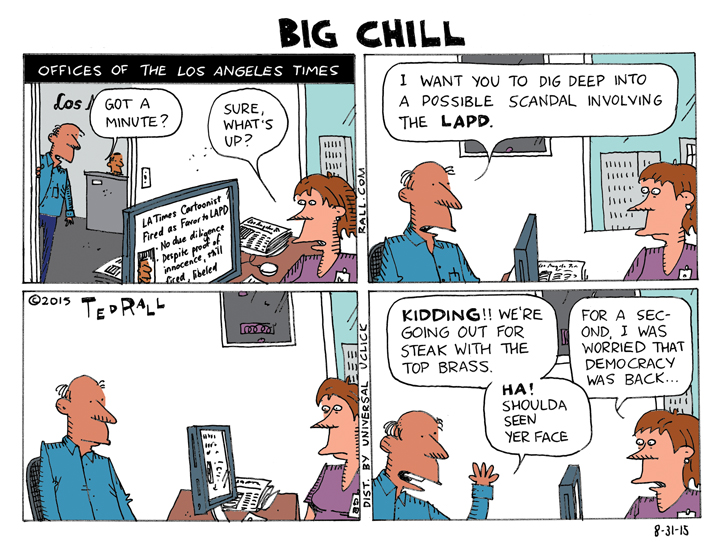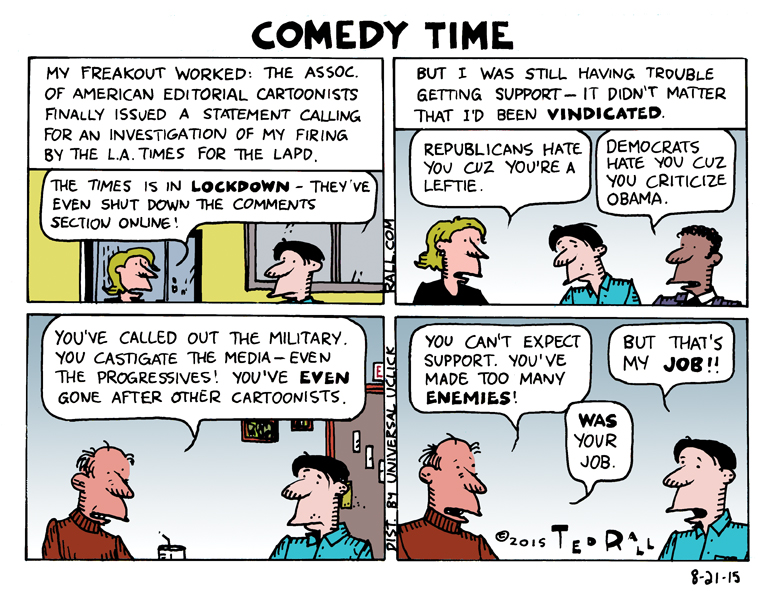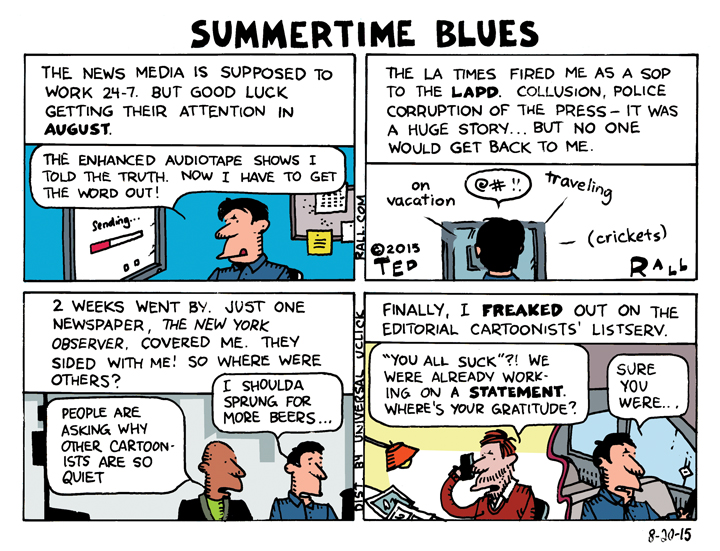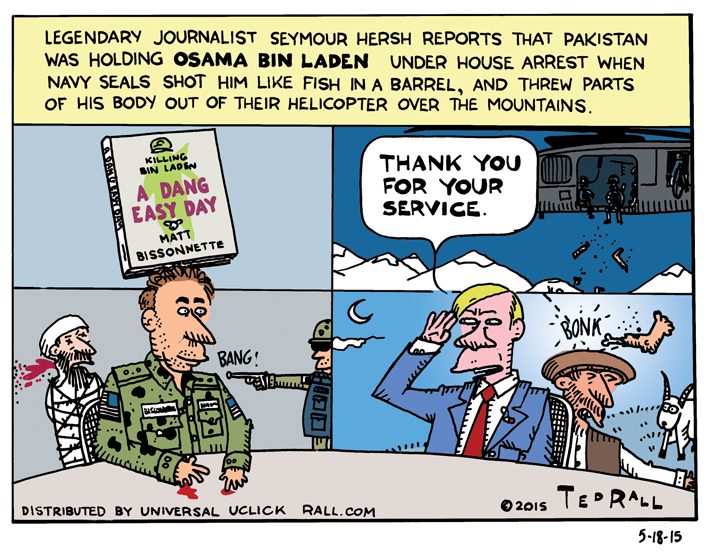First Hillary Clinton told a newspaper that Bernie Sanders wasn’t qualified to be president. When he shot back that her judgement made her unqualified, she pretended he’d attacked her out of nowhere. Such are the dynamics of a media narrative: it’s impossible to tell the true truth, only their truth.
SYNDICATED COLUMN: Inside the Media Bubble, No One Can Hear Us Scream

New York Times headline, April 12: “Donald Trump, Losing Ground, Tries to Blame the System.”
To normal people like you and me, it may seem strange that Trump might be denied the Republican nomination despite winning most of the primaries, and by sizable margins.
Not to the establishment.
Dripping with a what-a-whiny-baby tone, the Old Gray Lady argues that Trump has no one to blame for himself for losing states he, you know, won:
“Donald J. Trump and his allies are engaged in an aggressive effort to undermine the Republican nominating process by framing it as rigged and corrupt, hoping to compensate for organizational deficiencies that have left Mr. Trump with an increasingly precarious path to the nomination.”
“Our Republican system is absolutely rigged. It’s a phony deal,” the Times quoted Trump, saying that he was “accusing party leaders of maneuvering to cut his supporters out of the process.”
“They wanted to keep people out,” Trump continued. “This is a dirty trick.”
Any normal person would agree. You win the most votes, you win the election. Especially when it’s not close. Which, in the case of Trump (8.2 million) vs. Cruz (6.3 million) vs. Kasich (3 million), it isn’t. But the big corporate news media outlets don’t hire normal people; they hire rich kids who can afford graduate degrees from journalism schools that don’t give financial aid…kids born on third base who think they constantly hit home runs because they’re so damn smart.
The system is working great for them. Why change it?
The Times goes on to accuse Trump of “seeking to cast a shadow of illegitimacy over the local and state contests to select delegates” and “blaming the process rather than his own inadequacies as a manager.” Ted Cruz, on the other hand, is praised because he cleverly “outmaneuvered him [Trump].”
Trump had complained — “whined,” many news outlets called it — that he won the popular vote in the Colorado primary, yet came away with zero pledged delegates. This was because Cruz and his forces flooded the zone at the Colorado State Republican Convention, enticed party officials with trips and other gifties, and came away with all 33 delegates pledged to him.
The same thing happened in Louisiana.
Trump even expressed sympathy for Bernie Sanders. Despite winning all the most recent dates, the Democrats’ “superdelegate” system let insider favorite Hillary Clinton start this marathon at mile 16. “Bernie wins, Bernie wins, Bernie wins,” Trump said. “And yet he’s not winning. I mean, it’s a rigged system.”
He’s right. It’s also convoluted, arcane and corrupt.
Normally, when a system is widely viewed as overly complicated, and when it yields results that don’t make sense, people roll up their sleeves and try to fix it. We saw that recently in Hollywood, when no actors of color were nominated for the Oscars. There was an outcry. And a boycott. Then there were reforms.
Not American politics. In politics, you can win and win and win — and they can still take it away from you. After you get screwed, for the good of the country, you’re supposed to shut up and try again later (c.f. Nixon 1960) or slink off and get fat (c.f. Gore 2000).
So when Trump complains about losing what he’s winning, journalists never for a second consider the possibility that he’s right.
“You call them ‘shenanigans,'” CNN’s Anderson Cooper ridiculed Trump. “Those are the rules. And didn’t you know those rules?”
“I know the rules very well,” Trump replied. “But I know that it’s stacked against me by the establishment. I fully understand it.”
“You could have had a better organization on the ground,” Cooper scolded. “Your critics say it says something about your leadership ability — for somebody who touts himself as somebody who’s an organizational genius, who’s created this amazing business organization, that you couldn’t create an organization on the ground that could beat Ted Cruz’s organization.”
Inside the bubble, no one can hear us scream.
Talk about blaming the victim! Sure, Trump could have hired teams of professional politicos to navigate the peculiarities of each state’s primaries. As a billionaire, he certainly could have afforded them. Why didn’t he? I have no idea.
But why should he have to? Why should Trump, or any other candidate, be subject to such a strange system? Democracy should be simple and straightforward: one person, one vote. All these crazy rules — the signatures required for ballot access, the polls used to determine who gets to debate on television, winner-take-all primaries, superdelegates, delegates secretly pledged to candidates other those they’re sent to the convention to represent, the electoral college — exist for one reason. They exist in order to dilute the influence of we the people so that They — the ruling class — continues to get its way.
When They win, we lose. We lose our jobs. Our standard of living. Our rights.
If you’re like me — on the left and generally unsympathetic to billionaires — you may be tempted to join the media when they dismiss Trump as a whiner. But this is different. In business, Trump is the consummate insider. But he’s a political naïf. When someone as sleazy and unprincipled as Donald Trump is shocked by how dirty politics are, you have to take note.
And if they can steal elections from someone as rich as Donald Trump, there is nothing left of American democracy.
(Ted Rall is the author of “Bernie,” a biography written with the cooperation of Democratic presidential candidate Bernie Sanders. “Bernie” is now on sale online and at all good bookstores.)
SYNDICATED COLUMN: Everyone But the Media Saw Trumpism Coming
 If you suck at your job, you’ll get fired.
If you suck at your job, you’ll get fired.
If you suck because you’re lazy, you’ll definitely get fired.
Unless you’re a member of the political and economic establishment of a disintegrating superstate. If you’re incompetent and indolent but reliably loyal and unquestioning, your sinecure in the system that props up the powers that be is safe.
The New York Times, an institution so beholden to the establishment that it subjects a major presidential candidate to a media blackout and Orwellian post-publication memory-holing, is this week’s case study in establishmentarian unaccountability.
After effectively donating nearly half a billion dollars of free media coverage to the campaign of Donald Trump (or is it $1.9 billion? who can count?), corporate media is finally beginning to wonder whether teeing the country up for its first potential bona fide fascist dictatorship was a good idea.
In the Times, reliably mistaken op-ed columnist David Brooks allowed that, just maybe, opinion mongers like him ought to have noticed the building voter outrage over “free trade” deals like NAFTA and TPP — agreements supported by him and his paper’s editorial board — that gutted America’s industrial heartland and are driving the Bernie Sanders and Donald Trump campaigns. “Trump voters are a coalition of the dispossessed. They have suffered lost jobs, lost wages, lost dreams. The American system is not working for them, so naturally they are looking for something else,” Brooks wrote March 18th.
“Moreover,” continued the man who thought invading Iraq would be a cakewalk, “many in the media, especially me, did not understand how they would express their alienation. We expected Trump to fizzle because we were not socially intermingled with his supporters and did not listen carefully enough. For me, it’s a lesson that I have to change the way I do my job if I’m going to report accurately on this country.”
This is a stunning admission.
Let’s set aside the question of how likely it is that Brooks really will make the effort to get out more. (My guess: not very.) Why should the Times — and, more to the point, the readers whose paid subscriptions pay Brooks’ salary — keep a man on staff who admits that he sucks at his job because he’s too lazy to interact with the American people?
Brooks deserves to have plenty of company as he walks the unemployment version of the Long Green Mile.
On March 28th fellow Timesman Nicholas Kristof, famous for taking young men and women to Third World nations devastated by U.S. foreign policy (though I doubt he tells them why those dumps look so dumpy), went even further, in a piece titled “My Shared Shame: The Media Helped Make Trump.”
“We were largely oblivious to the pain among working-class Americans and thus didn’t appreciate how much his message resonated,” Kristof wrote.
Most Americans are working-class. In other words, Kristof and his colleagues admit they don’t cover the problems that affect most Americans. Again: why does he still have a job?
Believe it or not, there are scores — maybe hundreds — of opinion writers who do know what’s going on in their own country. Who write well. Who get stories right. Pundits who saw the Donald Trump and Bernie Sanders populist phenomena coming. But you won’t find any of them in the print pages of major newspapers like the Times, or even in the low-pay ghettos of their web-only content.
Because you can’t be a good journalist and a shill for a corporate media obsessed with access to the powers that be.
As usual in these moments of MSM navel-gazing, they almost get it right. Kristof continues: “Media elites rightly talk wabout our insufficient racial, ethnic and gender diversity, but we also lack economic diversity. We inhabit a middle-class world and don’t adequately cover the part of America that is struggling and seething. We spend too much time talking to senators, not enough to the jobless.”
Class diversity is a real thing. Newsrooms at stodgy institutions like the Times have their token women and people of color, but most are women and POC from well-off families. They attend expensive journalism schools that don’t offer scholarships, and thus don’t produce graduates from poor families and towns. As Barack Obama and Hillary Clinton prove, coming from a traditionally disadvantaged minority group is no guarantee that someone understands or cares about the troubles of the economically oppressed.
More to the point, we need a new class of intuitive journalists. Men and women with empathy. People who have a clue about what’s happening in their own country.
(Ted Rall is the author of “Bernie,” a biography written with the cooperation of Democratic presidential candidate Bernie Sanders. “Bernie” is now on sale online and at all good bookstores.)
SYNDICATED COLUMN: My Critique of Bernie Sanders’ Campaign
 Full disclosure: If New York’s primary were held today — not that it typically has a significant electoral impact, since it’s relatively late on the calendar — I’d vote for Bernie Sanders.
Full disclosure: If New York’s primary were held today — not that it typically has a significant electoral impact, since it’s relatively late on the calendar — I’d vote for Bernie Sanders.
Why Bernie? Because he’s the best this system has to offer: a flawed candidate whose overall message is important enough, and his record free enough of corruption and evildoing, that I can overlook the things I don’t like about his record and fill in the bubble next to his name on the ballot without feeling like a terrible person.
Hillary Clinton is nowhere close to acceptable. She has no message, other than the dead end of liberal identity-politics tokenism: sure would be neat (for her) if there were a first woman president. Her corruption is spectacular: served on the board of Wal-Mart, where she signed off on union-busting, was paid by Goldman Sachs, ran a charitable foundation like a money laundry. Voted for both of Bush’s wars, which killed hundreds of thousands of people, then destroyed Libya and Syria.
A vote for Hillary is a vote against working people, for the plutocrats, and for genocide.
However, just because I plan to vote for Bernie — even though I wrote the book on him— doesn’t mean I can’t see ideological and tactical flaws in his campaign. With that in mind, here’s my report card on the insurgent from Vermont’s bid to date.
The Good
Paris and San Bernadino aside, any political scientist will tell you that pocketbook issues — voters’ feelings about the economy, whether or not they’re prosperous, and how they perceive their future career prospects — usually determine the outcome of American presidential elections. Assuming there isn’t another 9/11-scale national security threat, the 2016 race will be about Americans’ sense that they’re working harder while earning less, and their anger that they’re still digging out of the 2008-09 financial crisis while the banks who created it are making bigger profits than ever.
No other candidate, left or right, can touch Bernie’s credibility on the economy. For decades, while no one paid attention, he shouted that the American economy was rigged in favor of the billionaire class at the expense of everyone else. Now most people agree.
Bernie owns the number one issue in the campaign.
That, as Donald Trump would say, is yuuuuge. Neither The Donald’s newfound openness to tax people like himself, nor Democratic rival Hillary Clinton’s awkward attempt to co-opt Sandersism with words instead of policies, stands a chance at denting the Bern on the number. One. Issue.
The other major metric for voters is character. Love him or hate him, everyone knows Sanders has integrity, which is why the Clinton camp’s cut-and-paste attempts to portray him as an NRA shill are falling flat. “Sanders may be a dreamer, but he’s not dishonorable. Trying to sully him in this way only sullies her,” columnist Charles Blow of The New York Times observes.
For an American politician, being widely perceived as honorable is virtually unheard of. It’s worth a billion dollars in attack ads.
The Bad
The biggest danger to Sanders’ campaign isn’t failing to get enough black votes in Southern states. (If he wins Iowa and New Hampshire, voters down South who haven’t paid much attention to the race yet will check him out — and he’ll do fine.)
Sanders’ third rail is being perceived as a Johnny One Note candidate obsessed with economic justice at the expense of everything else.
I’ve read everything written about and by Bernie Sanders. But his foreign policy prescriptions are as thin on the ground as U.S. troops in ISIS-controlled Iraq. Whether he’s disinterested in foreign affairs or simply cares more about all matters domestic, he doesn’t talk much about America’s role in the world. Big mistake. Voters expect a robust foreign policy agenda from their president.
As far as I can tell, a Sanders Doctrine is neither militaristic nor isolationist, deploying ground troops and aerial attacks more sparingly than either George W. Bush or Barack Obama. He told me he’d even continue Bush-Obama’s drone assassination program, which is illegal since it has never been authorized by Congress.
If I were running his campaign, I’d spin Sanders’ views as “real pragmatism” to take some air out of Hillary’s hawkish tough-broad sails. But I long for something more.
By 2016 measures Bernie’s foreign and domestic policy agendas are inconsistent. A self-described Scandinavian-style “democratic socialist” doesn’t usually favor wars of choice like Afghanistan (which Sanders supported) or drone killings. Voters assume he’s a pacifist or wish he were — why not become one? I wish he’d align his laudable desire for justice and equality at home for Americans with a push for freedom and self-determination abroad for citizens of other nations. Like: we don’t attack any other countries unless they go after us first.
Sanders is hobbled by some major communications problems. Hillary has exploited his failure to fully explain his healthcare plan by accusing him of wanting to increase taxes, outright lying. “If I save you $10,000 in private health insurance and you pay a little bit more in taxes in total, there are huge savings in what your family is spending,” Bernie tried to rebut at the fourth debate. Not clear enough.
Here, let me help: “Under my plan, your health insurance will be free. Free! The average American will save $10,000 a year. Your taxes will go up, but that tiny increase will be so much less than you’ll save. It’s the same deal almost every other country has, people all around the world love it, and you’ll love it too.”
The Ugly
Capitalism is less popular than most pundits know; socialism and communism are more popular too. In a general election campaign, however, it is true that Republican SuperPACs will air so many anti-Bernie attack ads featuring hammers and sickles you’ll think you’re at an old May Day parade in Moscow.
Bernie has to do more than explain his “democratic socialism.” Post-Hillary, he has to own it. And sell it to the American people.
“[Democratic socialism] builds on the success of many other countries around the world that have done a far better job than we have in protecting the needs of their working families, the elderly, the children, the sick and the poor,” Bernie said in November. Nice start, but can he erase a century of anti-communist propaganda in 10 months?
To me, the term is political self-mutilation. Sanders isn’t a socialist. He’s a old-school liberal Democrat, like George McGovern was in 1972. It’s ridiculous to have to defend something that you said about yourself when it isn’t true.
Next week, I critique Hillary Clinton’s campaign.
(Ted Rall is the author of “Bernie,” a biography written with the cooperation of Democratic presidential candidate Bernie Sanders. “Bernie” is being released today.)
SYNDICATED COLUMN: Politics Behind a Paywall: If CNBC Sponsors a Debate, Did It Really Happen?
There are two kinds of media censorship: direct and self-directed.
In an authoritarian regime, nothing gets published or broadcast without state approval. I watched the inner workings of direct government control of the press during a visit to Turkmenistan. Every magazine and newspaper was run out of the same office. Many were edited by the same people, all wearing the same lapel pins, an image of the country’s then-dictator, Sapamurat “Turkmenbashi” Niyazov.
This didn’t exactly make for a bunch of scintillating reads: the “our harvest rocks” stories were direct heirs of propaganda in the Soviet Union, of which the Turkmen SSR was a remote outpost. But it did offer clarity. The Turkmen people have never suffered from any illusions about the nature of their political system. They knew they weren’t free.
Censorship exists everywhere. In the so-called “free world,” however, political and cultural gatekeepers work to try to fool citizens into thinking that it does not. This morning, on NPR, I took note of an in-house ad in which an employee of the network claimed that it reports “unbiased news.”
There is, of course, no such thing as unbiased reporting or analysis. I’ve been listening to NPR for decades. In stories about foreign policy crises, never once have I heard an interview with a pacifist, someone who is against all military action. Whether it’s about Iran or ISIS, the “debate” is always between two varieties of interventionism: harsh (sanctions, i.e. “containment”) and harsher (bombs). If NPR’s “Marketplace” has ever interviewed a communist about why capitalism sucks and should be replaced, I missed it. Biased? You betcha. Always. Inevitably.
Here in the United States, censorship is usually self-directed. No one from the State Ministry of Propaganda calls The New York Times to tell them what’s fit to print. They make those decisions on their own. But those calls are informed by who those editors are — the elite schools from which they graduated (Columbia Journalism School), their class background (parents rich enough to send them to Columbia J-School), input from their friends and colleagues (other people whose parents are rich enough to send them to Columbia J-School). Who they are determines what makes it into print.
Which is often motivated by a desire not to offend those in power.
Major American media outlets are run by people who believe that they need access to those in power, which is to say government officials and corporate executives, in order to do their jobs. The Los Angeles Times, where I worked until July, fired me, apparently as a favor to the police. You see, I drew cartoons critical of police brutality and incompetence. The cops, understandably, didn’t like that. So they ginned up an excuse — since disproven — for the paper to get rid of me. Now they’re in a pickle. They know they messed up, but if they admit it they’ll hurt their relationship with the LAPD by revoking their favor to them. That might mean, the next time there’s a big O.J.-type crime story, that the LAPD refuses to feed them information.
A cartoonist colleague working in the Midwest tells me that, after he drew an anti-police cartoon, the cops stopped talking to his paper’s reporters. If the paper wants tips from the police, they’ve let his editors know, all they have to do is fire their cartoonist.
America, land of innovation, has now conceived of yet a third kind of media censorship: economic.
Last night, like millions of Americans, I turned on my TV to watch the third Republican presidential debate. Since I only subscribe to the basic cable package, however, I couldn’t get it. It only aired on CNBC, which where I live is on premium cable. (It didn’t livestream online either.)
I pay north of $120 a month for cable TV and broadband Internet access. This makes me a relatively privileged member of the mediarati. But not privileged enough. To watch a political debate — a civic ritual that used to be, and still ought to be, on every TV channel and radio station, free, by law — I would have to bump that up to something closer to $200. This is really, really wrong.
As a result, I — and other political commentators — are reduced to commenting on a debate as seen through the lens of media elites who have those $200 a month to spend.
Many millions of Americans, particularly young people, have “cut the cord” and watch only streamed television and movies. You can’t accuse them of apathy if you won’t let them participate in a presidential campaign.
Here’s how niche CNBC is. Debates sponsored by FoxNews and CNN averaged 24 and 23 million viewers, respectively. (After CNN offered livestreaming, Fox followed suit.) CNBC’s all-time viewing record is 3.9 million, during the 2002 Winter Olympics.
Economic censorship is gross. But, much like the brazenness of censorship under a dictatorship, putting politics behind a paywall serves as an unintentional signifier. The system is not of, by or for you, the people.
It’s the ultimate triumph of pay-to-play electoral politics: democracy without voters.
(Ted Rall, syndicated writer and the cartoonist for ANewDomain.net, is the author of the new book “Snowden,” the biography of the NSA whistleblower. Want to support independent journalism? You can subscribe to Ted Rall at Beacon.)
COPYRIGHT 2015 TED RALL, DISTRIBUTED BY CREATORS.COM
Comedy Time
Even after the Assocation of American Editorial Cartoonists issued a formal statement calling for an investigation of the LA Times’ firing of me as a favor to the LAPD because I criticized police brutality, I found it difficult to get support from, well, everybody. Because one of the defining aspects of satire is that, eventually, you end up making fun of everyone. Who end up hating you.
Summertime Blues
During the dog days of summer, I find out it’s extraordinarily difficult to get the media, or my colleagues, interested in my firing by the LA Times at the behest of the LAPD, who provided them with a tampered tape that wound up exonerating me. Or, perhaps, their silence has nothing to do with summer vacation season.
SYNDICATED COLUMN: If Rachel Dolezal is a Liar, What is Barack Obama?
Rachel Dolezal, the former Spokane leader of the NAACP who was born white but pretends to be (or “identifies as”) black, is widely assumed to be a lying con artist, suffering from psychological problems, or both. Many Americans, especially blacks who suffer at the hands of systemic racial discrimination, were furious at what they saw as Dolezal’s lack of — forgive me — skin in the game.
Unlike dark-skinned African-Americans pulled over by racist policemen for a broken taillight, she could opt out any time. Indeed, she did exactly that when she sued her alma mater, the historically black Howard University, for race discrimination — because she was white.
Dolezel has stepped down from her unpaid post where, by all accounts, she did a magnificent job. But what about another case of racial slumming that is not dissimilar from Dolezal’s, but far more prominent?
I speak here — though few others dare — of President Obama.
Obama, as everyone knows, had a black Kenyan father and a white American mother. Growing up in Hawaii, where so many people have multiple racial identities that they call themselves “chop suey” or “poi dog,” meaning “mixed” or “mutt,” Obama chose to sublimate his white ancestry and identify as fully black because he didn’t want to be, as friends remember, a “tragic mulatto” who had to suck up to whites.
Choosing which half of your family you prefer to identify with isn’t unusual. My mother is French and my father is American of German ancestry. I feel very French — I speak and read the language, listen to French music, follow French news, have dual French-American citizenship. I always assumed that was because my father wasn’t around while I was growing up, so he lost his chance to influence me. (But I’ve never denied his paternity, or the parts of my personality I believe came from him.)
Anyway, Obama’s situation was the reverse of mine. Like me, he was raised by his mom. The time he spent with his father could be measured in hours. If he’d followed the path of least resistance in terms of cultural influence, he would have identified as white. Instead, he took on the race of the father who left him.
Granted: race is a largely a cultural and political construction. Still, within the racial construct in which Obama and I (we’re almost the same age, and went to Columbia at the same time) grew up, he was and is biracial.
Why’d he ditch the biracial moniker?
The Census Bureau began identifying multiracial Americans in 2000. (You check off two or more boxes for race, as applicable.) In 2000, 6.8 million Americans declared themselves as having mixed-race ancestry. Not Obama — in 2010, as President, he declared himself solely African-American.
Sorry, mom.
How is this different than Rachel Dolezal? Both of them identify themselves as blacker than they are genetically: Dolezel 100% more, Obama, 50% more. Why is Dolezal, an obscure woman who worked hard to fight for blacks, catching more shit than Obama, arguably the world’s most powerful man, who has been roundly criticized for sitting on his hands when black Americans come under attack, as they did in a Charleston church this week?
If Dolezeal is “transracial,” as she told an interview, so is Obama.
“I think his choice [to declare himself African-American and not biracial] will have political, social and cultural ramifications,” Michele Hughes, president of the Chicago Biracial Families Network, said after stories about Obama’s census declaration appeared. Certainly, it sent a message to biracial children: the president of the United States is ashamed of his biracial heritage, and maybe you should be too.
“Aren’t people supposed to fill out their census forms accurately? Why else are we doing it? If everyone put down on the form how they “identified,” I don’t know what kind of count we’d wind up with, but clearly it would not reflect the racial makeup of the United States. As many have argued, race is an almost useless construct, so that might not matter, except in one very important area: If every biracial person chose one race, as Obama did, or as people had to do before the forms were changed in 2000, the census would portray a society more divided than it actually is,” Elizabeth Chang, who identifies as biracial (and actually is biracial) wrote in The Washington Post in 2010. “If the most powerful person in this country says that because society thinks he looks black, he is black, it sends a message that biracial children have to identify with the side they most resemble.”
It also endorses the hoary “single drop of blood” rule, which dates to slavery and dictates that if you’re 0.1% black, the law, and American culture, considers you 100% black.
As I said, I’m not personally vested in this discussion. But I dislike hypocrisy, particularly in the context of media pile-ons against average citizens while objectively much bigger targets stand around watching, untouched by the flinging mud. If Dolezal is scum for lying about her race, so is Obama.
Half-scum, anyway.
(Ted Rall, syndicated writer and the cartoonist for The Los Angeles Times, is the author of the upcoming book “Snowden,” the first biography of NSA whistleblower Edward J. Snowden. It is in graphic novel form. You can subscribe to Ted Rall at Beacon.)
COPYRIGHT 2015 TED RALL, DISTRIBUTED BY CREATORS.COM

